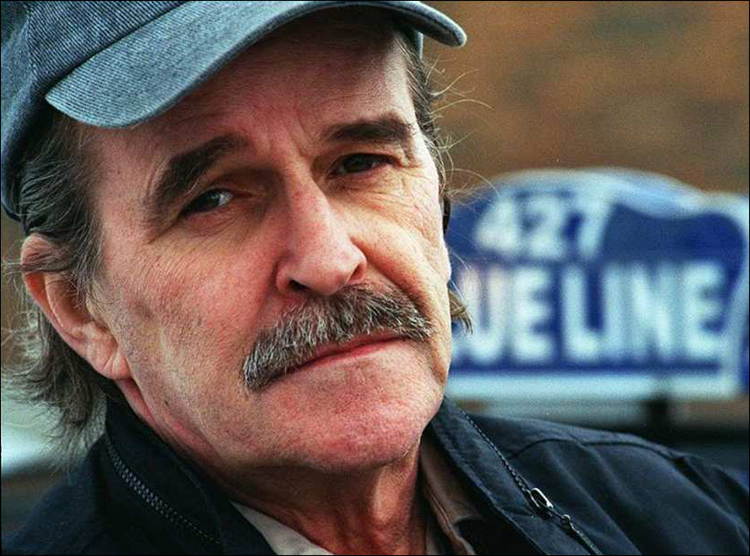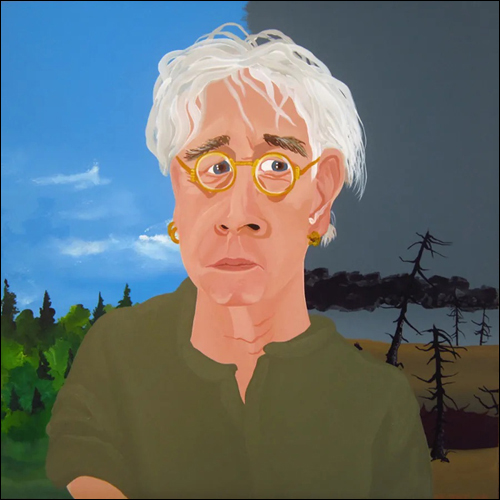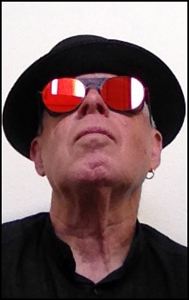July 6, 2016 – Poet, songwriter and erstwhile cab driver, Bill Hawkins died of cancer on July 4, 2016.
A poet is deeply conflicted and it’s in his work that he reconciles those deep conflicts.’
— Irving Layton
It’s traditional to begin these types of obituaries with an anecdote that best sums up the subject as a whole person.

But Bill Hawkins defies the one anecdote rule.
Bill Hawkins defied many of the rules, often to his personal and professional detriment.
And as with most people who communed with many, and lived the younger portion of life to excess, it’s occasionally difficult to determine where the truth ends and exaggeration begins.
Indeed, Kris Kristofferson might have written his song The Pilgrim for Hawkins – “He’s a walkin’ contradiction, partly truth, partly fiction? . . .”
First and foremost, Hawkins considered himself a poet – he WAS a poet, with several books and some fame to his name, and who early in his career was the opening act with Leonard Cohen for a poetry road show starring Irving Layton.
To many of Ottawa’s political elite, he was a cab driver of 35 years and always able to engage his customers in conversation whether the subject was Marcel Proust, Zen Buddhism, the latest episode of Homeland or last night’s Senators’ game.
So it’s no surprise that he had a group of regular customers – MPs, journalists, judges, political operatives and the like who contacted him directly when they wanted transporting from A to B with a little erudite conversation on the way.
And then there was Bill Hawkins the reluctant musician who could find his way up and down a guitar fret board, had a decent voice, but disliked being on stage.
Ottawa impresario and arts patron Harvey Glatt recalls booking Hawkins’ band The Children as one of the opening acts for The Lovin’s Spoonful and The Association. It was at Maple Leaf Gardens in the mid-’60s.
“Bill walked off the stage and said ‘that’s it for me. I’m done performing.’ ”
Hawkins was in three bands – The Children, Heavenly Blue and The Occasional Flash – with members that variously included Bruce Cockburn, Sneezy Waters, Amos Garrett, Sandy Crawley, David Wiffen, Neville Wells and other luminaries of the 1960s Ottawa music scene.
Sneezy Waters recalls a poet who was reluctant to become a songwriter – or perhaps writing songs had never occurred to him.
“Bruce began to write the music for some of Bill’s poetry,” Waters, “Then told Bill ‘you’re missing out on 50 per cent’ start writing the music. But there weren’t too many people writing songs in those days. Bruce and Sandy Crawley wrote some, but most of us did covers.”
And so it was that the poet became a songwriter.
Perhaps the best reference for how good a songwriter he became is the double compilation album Dancing Alone produced by Ian Tambyn and featuring an array of younger and older singer-friends, including Cockburn, Waters, Murray McLauchlan, Sandy Crawley, Lynn Miles, Ana Miura and Neville Wells.
“When I think back to those early days I see Bill as a cool gent and recall great conversations,” recalls Waters. “I didn’t see too much of him in later years, but I play with my band every year at the (NAC’s) Fourth Stage and he always did his best to come down – last time, with his big bottle of oxygen.
“Bill has always been with us and was always going to be with us,” adds Waters, “and then suddenly he’s gone. Many of us had wonderful relationships with him.”
Cockburn recalls his early writing experiences with Hawkins somewhat differently than Waters’ version of events and says he was writing music for Hawkins’ lyrics and that it was Hawkins who encouraged him to write his own.
“Bill was an inadvertent mentor to me,” Cockburn told the Citizen on Wednesday. “I don’t think he would have seen himself that way, but he had that influence and it was important to me. We were both interested in the mystical and metaphysical things that were around in the ’60s. And I had been studying the beat writers in high school and I equated Bill with the great beat poets. I held him in great esteem.”
Cockburn says he lost contact with Hawkins for a long period after those musical beginnings and didn’t re-connect until a decade or so ago at the Ottawa Folk Festival when Hawkins had emerged from his alcohol and drug abuse.
He went pretty dark but became a somewhat different person,” adds Cockburn. “He had become a gentler person and more considerate of other people’s feelings. It looked good on him.”
Musician David Wiffen, Hawkins’s close friend of 50 years, describes him as “a smart and talented, very caring and loving individual.”
Both Wiffen and Hawkins shared a notoriety for alcohol and drug abuse that too often pulled them into dark abysses.
“He helped me out when I was down on my luck,” says Wiffen. “He’d give me somewhere to sleep and something to eat until I got on my feet again.”
Wiffen, who wrote his classic song ‘More Often Than Not’ in Hawkins’ basement, credits the cab-driving poet with encouraging him pursue songwriting.
“He taught me it was all right to write and wasn’t just a fool’s errand,” says Wiffen. “Bill wrote a lot of his songs with my voice in mind. I was also the first person to record his material on the 3’s A Crowd album.”
(3’s A Crowd was another group with multi-personnel changes during its short life from 1964-69).
An emotional Wiffen was still coming to terms with Hawkins’ death when he spoke with the Citizen on Tuesday.
“The first time I met Bill he said: ’I think we’re going to be very good friends. He became my best friend – a dear and caring best friend.”
In his book “We Are As the Times Are: The Story of Café Le Hibou” author Ken Rockburn refers to Hawkins as “The Ringmaster” to describe his influence on the Ottawa music scene of the 1960s and early ’70s.
It was his friend and fellow musician Sandy Crawley who came up with the ringmaster epithet.
Poet and novelist Roy MacSkimming rounded out Hawkins of the 1960s for Rockburn: “He took drugs, drank too much, and insulted important people. In fact, he insulted most people, important or not, more or less on principle. A few exceptions earned his respect – artists of one kind or another who were his close friends.”
One of the better-known, perhaps apocryphal, Hawkins anecdotes involved the $6,000 Canada Council grant he got back in the day when $6,000 was a handsome sum – especially in Mexico where Hawkins re-located with the grant money.
He returned six or seven months later with no money and one poem.
When someone asked why only one, Hawkins replied: ‘They didn’t tell me how many they wanted.’
William Alfred Hawkins died July 4 of cancer. He was 76. He is survived by his adult children Andries, Jennifer and Cassandra. Family and friends will place a plaque in his memory at Beechwood Cemetery’s Poet’s Corner on Friday. A future public event is being talked about.
Credit: Remembering Bill Hawkins – the poet who became a songwriter by Chris Cobb.
July 5, 2016 – CBC.ca | All In A Day | Bruce talks about Bill Hawkins
Ottawa poet and songwriter William Hawkins has died; his old friends, fellow songwriters Sneezy Waters and Bruce Cockburn, join All in a Day with some memories.









